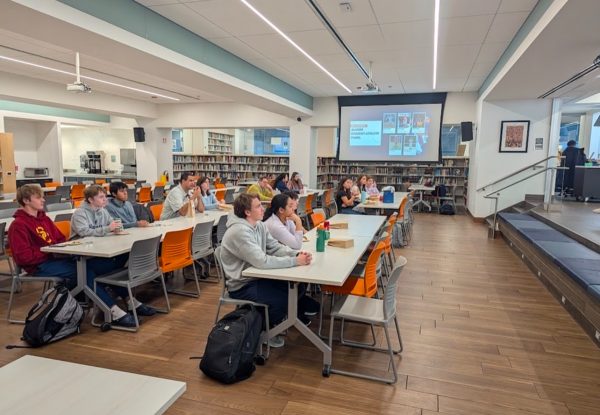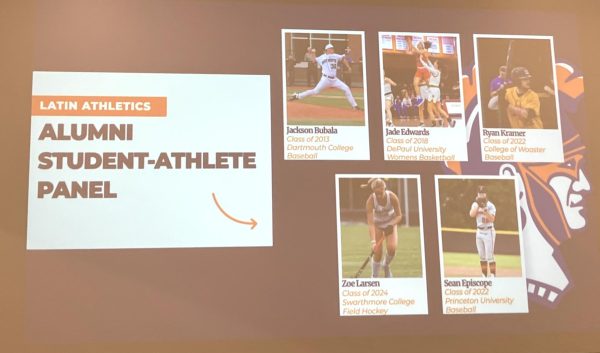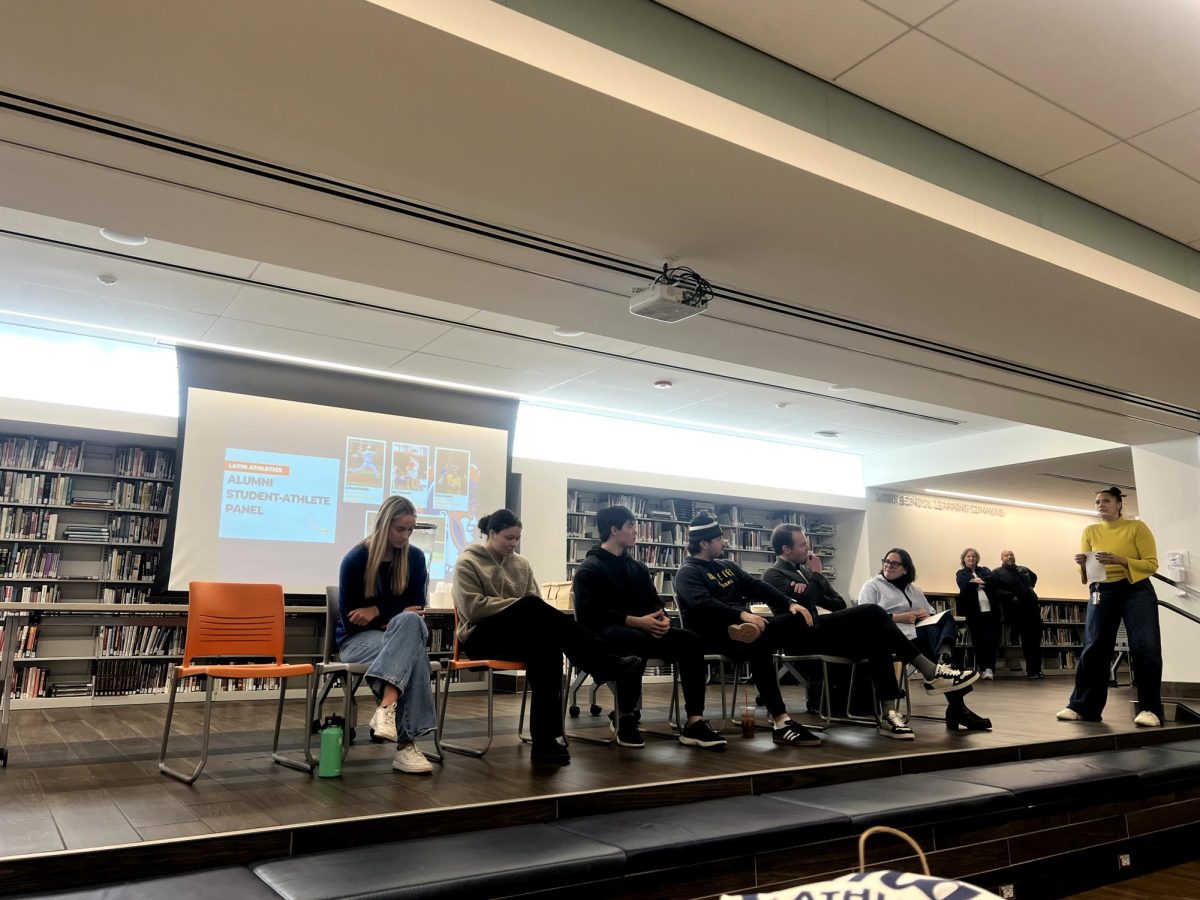While most seniors eagerly await college decision letters, student-athletes embark on a different journey: college recruitment. Athletes juggle recruitment tournaments, scouting, rigorous camps, and a delicate balance between academics and athletics. Although this process can be isolating and overwhelming, student-athletes are not alone. To shed light on this process, Upper School Athletic Director Katie Johnson hosted a panel on January 15, featuring collegiate student-athletes who are Latin alumni and provided insight into their experiences.
The panel comprised a talented and diverse group of athletes, including Zoe Larsen ‘24 from Swarthmore College (field hockey), Jackson Bubala ‘13 from Dartmouth College (baseball), Jade Edwards ‘18 from American University and, more recently, DePaul University (basketball), Sean Episcope ‘22 from Princeton University (baseball), and Ryan Kramer ‘22 from College of Wooster (baseball). During the panel discussion, they spotlighted the difficulties of the college recruitment process and advised fellow student-athletes.


The alumni emphasized the demands of maintaining athletic and academic excellence. Each panelist shared personal strategies for standing out during recruitment, the implications of college choices, and the significance of balancing athletic commitments with personal and academic growth. While the insights of these panelists can guide rising college athletes to a fulfilling college experience on and off the field, it’s important to remember that this panel is just one of many recruitment resources.
Following is the Q&A from the panel discussion:
Katie Johnson (KJ)
Ryan Kramer (RK)
Zoe Larson (ZL)
Jackson Bubala (JB)
Sean Episcope (SE)
Jade Edwards (JE)
Junior Abby Krasaeath (committed to Brown University for field hockey)
What did you do to stand out in the recruitment process, and what did you find beneficial?
I think selling yourself is the most important key. Let these coaches and schools know why they need you and what makes you special that sets you apart from any other player in your sport. I would say that persistence is huge. Make sure they know who you are and keep it specific to their schools and universities.
What are some things that you thought were beneficial to put in [recruitment] videos?
I was writing emails and—especially in my highlight reels—I would clip good plays of me dribbling the ball for a while. But also, I’d show if I make a good pass and see that play develop.
What were some specific things that you looked for when you were trying to make your college decision and what programs you [were] interested in?
When I visited Dartmouth, it felt like magic. It was like, ‘Oh, man, this is sweet. I can see myself here.’ That’s a high bar—you can’t visit every place, but you could get a feel for what college campuses are like, and talk to people who have gone there. Players are on social media, so you can figure out quickly what the vibe is like, what we care about, and how people act. Life is very long, and sports are short, so figuring out a place that gives you the best opportunity to succeed outside of sports was important to me.
I picked out what I did and didn’t like from Latin and went from there. Don’t narrow [your top school choices] too quickly, because you will get yourself in a hole. The week I committed, it was a hard decision, but what helped me decide was visiting both of the schools that I was deciding between and evaluating how I felt about the team, the culture, how I would make a difference on the team, and if I was I going to go there and play a lot. Also, if I could never play my sport again, would I still be happy at this school and not want to be somewhere else?
How do you handle rejection and how do you bounce back?
There are a ton of colleges, there are a ton of student-athletes, and if a coach says no, it’s not the right place for you. You’re going to be working with that coach for four years, hopefully in a way that’s productive for both sides. If you try hard enough and are realistic about what you bring to the table, there will be someone else willing to [embrace your potential].
Talk to somebody who’s done it, and then second off, practice emailing as many coaches and as many people as you can, because you never know until you try. The coach doesn’t know who you are until you email them, so the best thing you can do is reach out. If you do get a “no,” okay. Move on. So, initially, reach out to as many people as you can to test the waters, and then go from there.
What were your fears, worries, and anxieties going into college athletics?
Going into college, I was a little scared to ask for help. I didn’t want to use my resources. I wanted to figure it out on my own, and that was 100% a mistake. I should have contacted people about whatever it was: school, athletics, baseball.
People on my team have said they came from their high school being one of the best athletes. Then you’re going to a school where everyone feels like that, and you’re not going to be the best at whatever you do anymore. And that’s scary. Sometimes, you will feel imposter syndrome but know that you’re there for a reason, and it’s all going to be fine.
Honestly, sports are a great distraction. Sports are a great way to keep your head down and get rid of some anxiety or stress. Everybody’s in the same boat as you. My biggest questions were: What is going to happen? I’m going to college with people I don’t know. Am I ever going to play? If you put in the work and do the right thing, it will work out.
How are you balancing (or how did you balance) athletics, academics, and social life?
Your job is athlete first, especially when you’re in season. You’re flying to games, you’re traveling to games, you’re missing lots of school. It’s different [from] high school, where you only leave at the end of the day or get your work done there. So you spend time playing catch-up and trying to stay ahead of the game. At least for me, my coaches would say basketball was your first class, and everything else followed.
My experience was different; I never had to miss a class. I chose a school that was [Division 3], and my school discouraged athletes in the athletics programs from taking time out of academics for athletics.
What resources did you have or know of for athletes at your school or general academic resources?
In my experience, Princeton doesn’t treat athletes any differently than they do students, so we don’t get any special treatment in terms of study halls or anything like that. Thankfully, they’re good about the resources they give to regular students, so there are centers where they have tutors. If you play sports, use students who have taken your class, because they can tell you what you need to know and where they might have past study material. That’s a big network that you can take advantage of.
Is there anything in the recruitment process or transfer portal that you would have changed?
This is a great opportunity to practice talking to people and selling yourself. I would also practice saying no. Coaches appreciate you having your list of what you’re looking for. The better you communicate what you want, the more successful you will be. Entering the portal is also a huge decision. It was the hardest thing I ever did because I spent four years at my school. What I’d say about the portal is, don’t burn any bridges. You want to leave that place positively because they will talk about you wherever you go. If you find yourself in a position that you have to transfer, leave on a good note.
How do you balance sports with [internships and jobs] in college?
It’s easy to look at the other students at your school and see all the internships they’re doing, or they’re full-time employees somewhere and making money, and you’re at practice and you have no idea what you want to do. The best thing you can do when you’re in it is to look at all the skills you’re acquiring.
How has being a student-athlete helped you in your professional career?
The biggest thing is discipline. From an academic and athletic standpoint, you cannot survive unless you’re disciplined. So discipline and learning how to face adversity are skills that I rely on day to day. I think athletics has helped me tremendously in my career.

















































